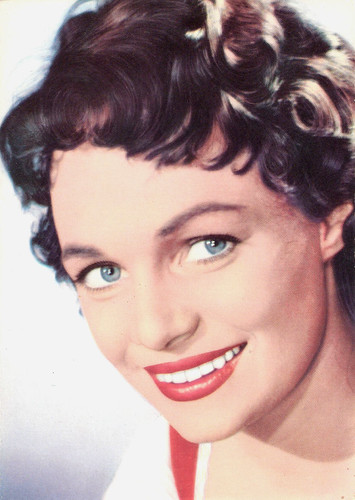
German postcard by ISV, no. M 10. Photo: Europa Film / Czerwonski.
Seductive, mysterious girl
Renate Ewert was born in Königsberg, Germany (now Kaliningrad, Russia), in 1933. Her father was a respected grain trader, and her mother came from Poland. During the Second World War, mother and daughter fled Königsberg when the Russian front came closer. They settled in Hamburg. Her father followed, after spending four years as a prisoner of war.
Renate convinced her father not to let her finish school and instead went to acting classes by Ida Ehre. She applied for the Hamburger Kammerspiele but was rejected. She played in some roles on stage and did synchronising jobs for foreign films. When director Paul May was casting the role of Barbara Bruks in the third part of the successful series 08/15 – In der Heimat/08/15 - In the homeland (Paul May, 1954), he chose the then 20-year-old Ewert. The film series was based on Hans Hellmut Kirst's novel.
From then on, Ewert appeared in many post-war films as the seductive, mysterious girl but never got the dramatic parts she was eager to play. Ewert gained a reputation for lateness and for not always being too reliable on set. She also became fodder for the tabloids, when she had several affairs with such celebrities as actors Erik Schumann and Harald Juhnke, Wörthersee playboy Gerhard Berndt, and beverage dealer Hans-Hermann Weyer.
While filming the comedy Mikosch im Geheimdienst/Mikosch in Secret Service (Franz Marischka, Franz Josef Gottlieb, 1958), she started an affair with married producer Franz Marischka. He was 19 years her senior and the tabloids went wild. There were rumours she was the cause of Marischka’s divorce from his wife, Inge.
Later, she, Marischka, and Inge, now his ex, lived in the same apartment house in Munich-Schwabing, only two stories apart. She also had an affair with actor Paul Hubschmid while he was on the Vienna stage in My Fair Lady. Renate became the cause of the first suicide attempt by his wife, Ursula von Teubern. When Ursula Hubschmid eventually committed suicide, Renate felt guilty and started taking drugs.
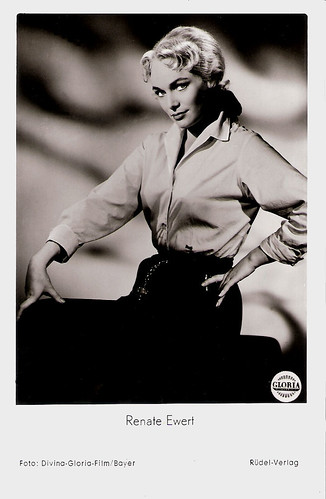
German postcard by Rüdel-Verlag, Hamburg-Bergedorf, no. 1499. Photo: Divina / Gloria / Bayer. Publicity still for 08/15 III. Teil/08/15 at Home (Paul May, 1955).

German postcard by Kolibri-Verlag, Minden/Westf., no. 2026. Photo: Rhombus / Herzog-Film / Czerwonski. Publicity still for Lumpazivagabundus (Franz Antel, 1956).
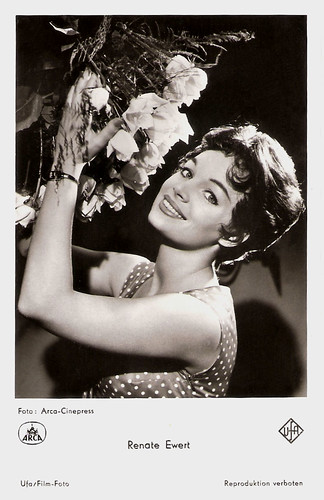
German postcard by Ufa, Berlin-Tempelhof, no. FK 4048. Photo: Arca / Cinepress. Publicity still for Liebe kann wie Gift sein/Love can be like poison (Veit Harlan, 1958).
Pills and alcohol
In 1960 Renate Ewert starred in the West German/Danish crime film Der rote Kreis/The Crimson Circle (Jürgen Roland, 1960). Scotland Yard detectives pursue a ruthless league of blackmailers known as The Crimson Circle. It was one of the many German Edgar Wallace adaptations of the 1960s, in this case of the 1922 novel The Crimson Circle. Der rote Kreis was the second film in the Wallace series produced by Rialto. The film's success encouraged the producers to meet with Penelope Wallace and secure the film rights for all available Wallace novels.
That same year, Renate also starred in Schlagerparade 1960 (Franz Marischka, 1960) and in the follow-up Schlagerparade 1961 (Franz Marischka, 1961). In France, she made the films L'appartement des filles/Girl's Apartment (Michel Deville, 1963) with Mylène Demongeot, and Échappement libre/Backfire (Jean Becker, 1964) starring Jean-Paul Belmondo.
Another thriller was Hotel der toten Gäste/Hotel of the Dead Guests (Eberhard Itzenplitz, 1965) starring Joachim Fuchsberger, Karin Dor, and Elke Sommer. It was based on a novel by Heather Gardiner, an Australian mystery author who died in a car crash after just publishing two novels. In the film, which was shot in Bavaria, the police are called to a hotel, filled with visitors in town for a music festival, where one of the guests has been murdered. Ewert also had a supporting part in Angélique, marquise des anges/Angélique (Bernard Borderie, 1964), the first part of the series of romantic costume films based on the popular novels by Anne and Serge Golon. Despite the success of this film, an international career was not established.
On 10 December 1966, Renate Ewert was found dead on the floor of the bedroom of her apartment in Munich. She was found by actress Susanne Cramer, a friend who lived in the US and wanted to visit her. Ewert had died of pills and alcohol several days earlier, only 33. Dressed in a nightgown and weakened by pills, she starved to death and was nothing but skin and bones. In death, her weight was only 34 kilos.
A month earlier her friend, Franz Marischka had left for Berlin, and shortly afterwards, her telephone service was cut because of non-payment. Distraught at the death of his daughter, her father Paul Ewert, who had insisted on an autopsy to determine the cause of death, took his life in 1967 with sleeping pills. In his suicide note, he asked his wife to forgive him. His wife Helene poisoned herself in 1969.
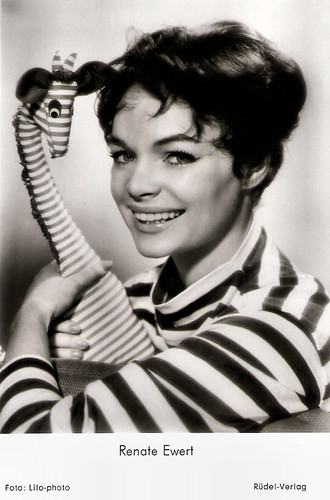
German postcard by Rüdel-Verlag, Hamburg-Bergedorf, no. 2633. Photo: Joe Lilo.
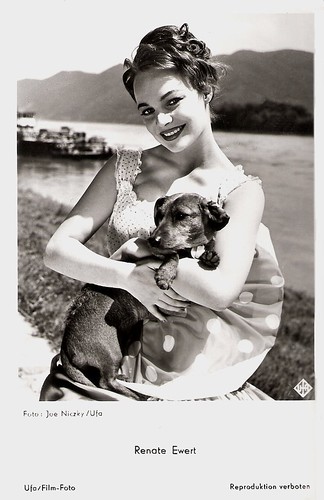
German postcard by Ufa, Berlin-Tempeldorf, no. FK 3113. Photo: Joe Niczky / Ufa.
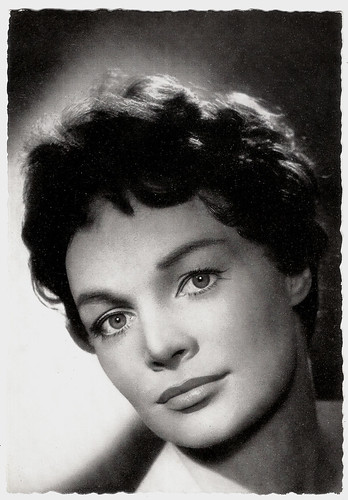
German postcard by WS-Druck, Wanne-Eickel, no. 300. Photo: Bavaria / Terrascope / Schorcht.
Sources: Holger Haase (Hallo, hier spricht...), F. Wassermann (IMDb), Glamour Girls of the Silver Screen, Wikipedia (German and English) and IMDb.
This post was last updated on 23 February 2024.
No comments:
Post a Comment